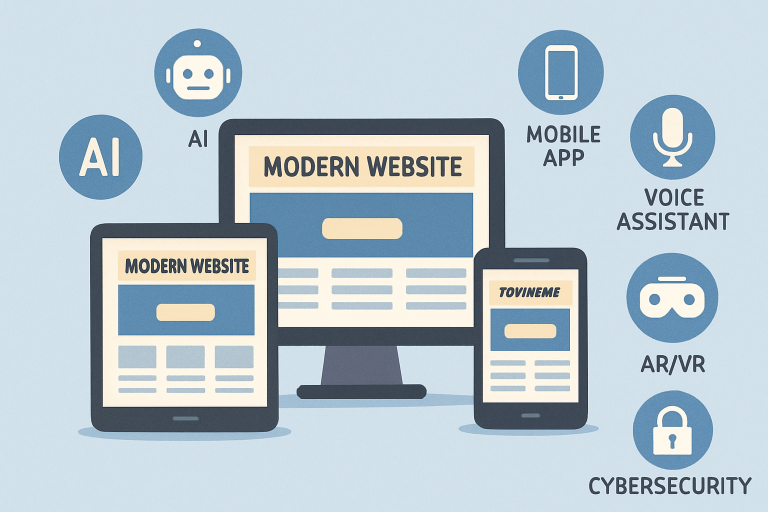Home Business Magazine Online
Key Takeaways
- Integration of Artificial Intelligence (AI) is revolutionizing user interactions and personalization.
- Progressive Web Apps (PWAs) are bridging the gap between web and mobile applications.
- Voice search optimization is becoming essential due to the rise of voice-activated devices.
- Augmented Reality (AR) and Virtual Reality (VR) are creating immersive web experiences.
- Emphasis on cybersecurity is paramount to protect user data and build trust.
Introduction
The digital landscape is evolving rapidly, and businesses must stay current to attract and retain users. In 2024, cutting-edge advancements are redefining what customers expect from websites, making it critical for brands to focus on innovative solutions that foster loyalty and drive conversions. Whether you’re an entrepreneur or part of a large enterprise, understanding these changes can give you a clear advantage in crafting future-ready online experiences. For companies looking to thrive in this dynamic environment, integrating professional web design and internet marketing is more important than ever.
As more organizations compete for digital real estate, investing in the latest website development trends can boost engagement, streamline operations, and improve security. From AI-powered personalization to seamless progressive web apps, developers now focus on usability, speed, and safety. High customer expectations make staying ahead of tech trends essential.
The rise of smart devices and digital services increases pressure on companies to meet user demands, outperform competitors, protect data, and ensure accessibility. Trends like voice search and immersive reality are now active requirements for online success.
These changes impact not only startups but also all sectors. Adopting these trends helps brands meet market needs, build trust, and discover growth opportunities.
Artificial Intelligence Integration
Artificial Intelligence (AI) is leading a paradigm shift in web development by transforming how users interact with websites and access information. Through AI-powered tools such as chatbots, voice assistants, and smart recommendation engines, developers can provide highly tailored experiences that adapt to individual preferences in real-time. For instance, natural language processing and machine learning algorithms can analyze user behavior to deliver content, offers, and functionality that perfectly match unique needs.
AI is also automating routine tasks for both users and businesses—think intelligent search, content moderation, and predictive customer service. These improvements save time and reduce friction, empowering companies to boost satisfaction and engagement. According to Forbes, AI-driven websites are already outperforming static sites in everything from conversion rates to user retention metrics.
Progressive Web Apps (PWAs)
Progressive Web Apps (PWAs) are gaining prominence by offering users the advantages of native mobile applications within the browser. These apps can function seamlessly even when offline, load faster, and provide a consistent experience across devices. PWAs leverage features such as push notifications, background data syncing, and home screen icons to create user experiences that feel app-like and highly accessible.
For businesses, PWAs dramatically reduce the need to maintain separate codebases for web and mobile applications. This not only reduces website development costs but also accelerates updates and ensures that all users benefit from new features simultaneously. As outlined in a recent analysis by TechRadar, major brands adopting PWAs report improved engagement and increased conversion rates, underscoring the strategic value of this technology.
Voice Search Optimization
The meteoric rise of voice-controlled devices, such as Amazon Echo, Google Nest, and Apple HomePod, has dramatically changed user search behaviors. In 2024, websites that aren’t optimized for voice search risk being overlooked, especially as more consumers lean on conversational searches for speed and convenience. Effective voice search optimization involves using schema data, prioritizing mobile responsiveness, and reshaping content for natural, question-based queries.
This trend is influencing SEO strategies industry-wide, driving developers to create structured, succinct, and easily accessible information that voice assistants can “read” and serve up quickly. As referenced by Search Engine Land, voice search not only boosts website visibility but also ensures ongoing relevance in the evolving digital marketplace.

Augmented and Virtual Reality
Augmented Reality (AR) and Virtual Reality (VR) are being increasingly integrated into mainstream websites, moving far beyond entertainment and gaming into sectors such as retail, education, and healthcare. In e-commerce, AR is revolutionizing product visualization, letting customers preview furniture in their homes or try on glasses virtually before buying. VR is empowering training simulations and immersive product tours, offering value-added experiences that captivate visitors and boost retention.
For example, IKEA’s AR-powered shopping tools exemplify how brands can offer interactive environments that reduce uncertainty and increase buyer confidence. As this technology becomes more cost-effective, small and mid-sized businesses are starting to integrate AR and VR features into their web strategies, signaling a wider adoption across the industry.
Enhanced Cybersecurity Measures
Cybersecurity remains a top priority as threats evolve and become more sophisticated. From phishing scams to data breaches, users expect strong protection when sharing personal information online. Modern websites are now built with robust security frameworks, including multi-factor authentication, SSL/TLS encryption, and advanced web application firewalls. Developers are also focusing on content security policies (CSP) to prevent cross-site scripting and other malicious attacks.
The adoption of these enhanced measures strengthens the brand’s reputation and builds user trust, especially as regulatory frameworks become stricter. Resources from organizations like the Cybersecurity and Infrastructure Security Agency offer evolving best practices, emphasizing that security is a non-negotiable cornerstone of all modern website development trends.
Conclusion
Staying ahead of website development trends is crucial for businesses aiming to deliver exceptional user experiences and safeguard their bottom line. Adopting artificial intelligence, deploying progressive web apps, optimizing for voice search, leveraging AR/VR, and implementing state-of-the-art security measures equip brands to excel in a digital-first marketplace. By transforming your online presence with these strategies, you’ll ensure your website remains both competitive and future-proof in today’s ever-changing environment.
The post Modern Website Development Trends 2025 appeared first on Home Business Magazine.





